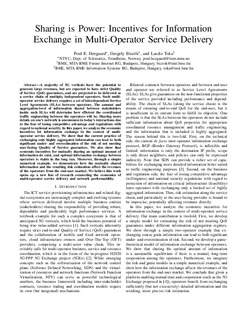Sharing is Power: Incentives for Information Exchange in Multi-Operator Service Delivery
Chapter
Accepted version
Permanent lenke
http://hdl.handle.net/11250/2435152Utgivelsesdato
2016Metadata
Vis full innførselSamlinger
Sammendrag
A majority of 5G verticals have the potential to generate large revenues, but are expected to have strict Quality of Service (QoS) guarantees, and are projected to be delivered as a service chain of multiple, independent operators. Such multi-operator service delivery requires a set of interdependent Service Level Agreements (SLAs) between operators. The amount and aggregation-level of information shared between stakeholders inside such SLAs will determine how efficient the coordinated traffic engineering between the operators will be. Sharing more details on one's network is uncommon in today's interactions due to the fear of losing competitive advantage and regulations with regard to national security. In this paper, we analyze the economic incentives for information exchange in the context of multi-operator service delivery. We show that the current practice of exchanging only highly aggregated information can lead to both significant under- and overestimation of the risk of not meeting user-facing Quality of Service guarantees. We also show that economic incentives for mutually sharing an optimal amount of information do exist, and optimal information exchange between operators is viable in the long run. Moreover, through a simple numerical example, we demonstrate how the mutually shared information and the resulting risk estimation affect the revenues of the operators from the end-user market. We believe this work opens up a new line of research connecting the economics of multi-operator service delivery and network performability.
